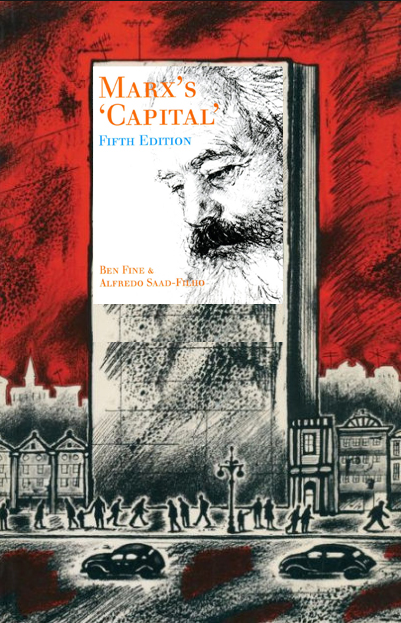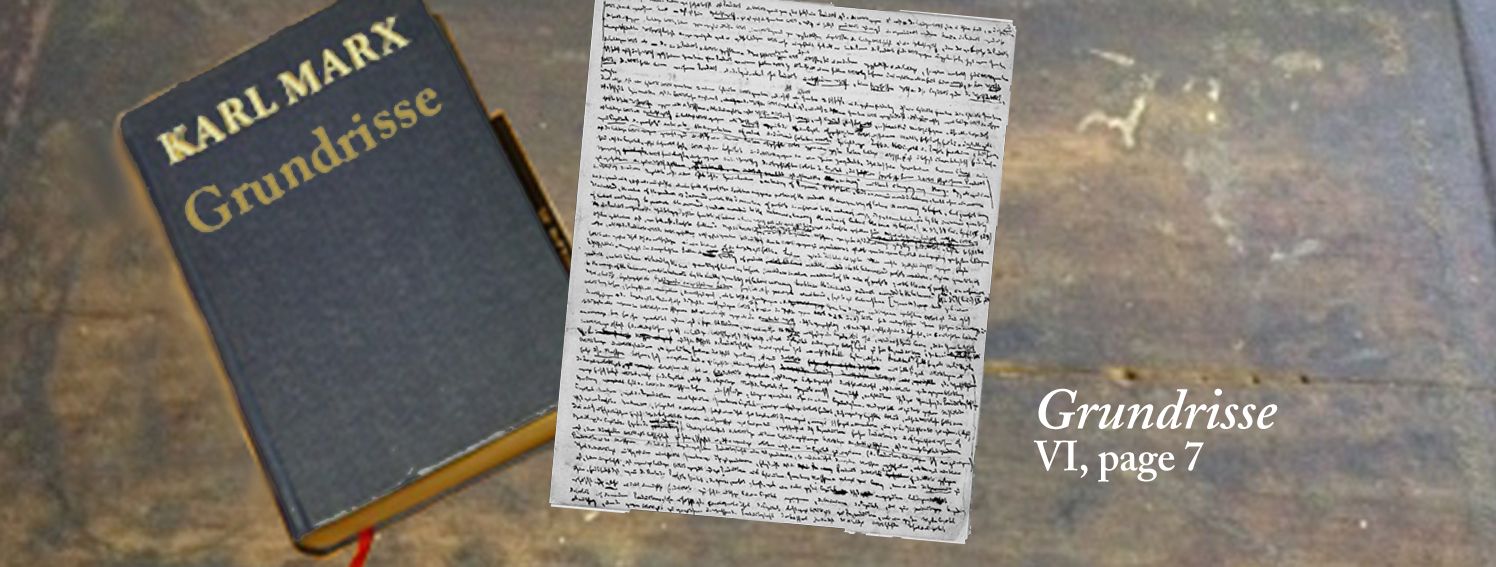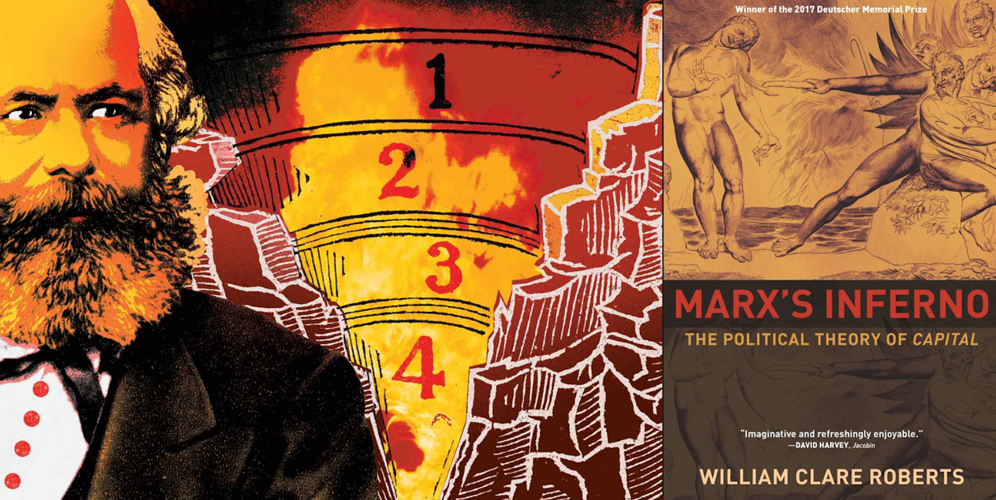Capital

Capital: A Review of Volumes 1 and 2
The People's Forum 320 West 37th Street, New York, NY, United StatesIn review of Volumes One and Two of Capital and in preparation for our study of Volume 3 we will have a 4 week intersession reading from Ben Fine and Alfredo Saad-Filho’s Karl Marx’s Capital. These sessions are suggested as a good review for those who would like to join in for the coming sessions of our close reading of Volume 3 which will begin on January 18. Of course, anyone interested in a review of Capital and/or would simply like to read and discuss the Fine and Saad-Filho book are encouraged to attend as well.

Capital: A Review of Volumes 1 and 2
The People's Forum 320 West 37th Street, New York, NY, United StatesIn review of Volumes One and Two of Capital and in preparation for our study of Volume 3 we will have a 4 week intersession reading from Ben Fine and Alfredo Saad-Filho’s Karl Marx’s Capital. These sessions are suggested as a good review for those who would like to join in for the coming sessions of our close reading of Volume 3 which will begin on January 18. Of course, anyone interested in a review of Capital and/or would simply like to read and discuss the Fine and Saad-Filho book are encouraged to attend as well.

Unearthing The Grundrisse (continuation)
After the defeat of the 1848-50 revolutions in Europe, Marx acknowledged that he failed to provide an adequate analysis of the economic foundation of society and turned from a focus on organizing to an intense, life-long study of political economy. Catalyzed by the first global economic crisis in 1857 and after 10 years of concentrated study, he started the first of seven notebooks to self-clarify his work up to that point. Not published or available outside the USSR until 1953, Martin Nicolaus provided the first—and only —English translation of all seven notebooks in 1973 as the Grundrisse: Foundations of the Critique of Political Economy.

Unearthing The Grundrisse (continuation)
After the defeat of the 1848-50 revolutions in Europe, Marx acknowledged that he failed to provide an adequate analysis of the economic foundation of society and turned from a focus on organizing to an intense, life-long study of political economy. Catalyzed by the first global economic crisis in 1857 and after 10 years of concentrated study, he started the first of seven notebooks to self-clarify his work up to that point. Not published or available outside the USSR until 1953, Martin Nicolaus provided the first—and only —English translation of all seven notebooks in 1973 as the Grundrisse: Foundations of the Critique of Political Economy.

Unearthing The Grundrisse (continuation)
After the defeat of the 1848-50 revolutions in Europe, Marx acknowledged that he failed to provide an adequate analysis of the economic foundation of society and turned from a focus on organizing to an intense, life-long study of political economy. Catalyzed by the first global economic crisis in 1857 and after 10 years of concentrated study, he started the first of seven notebooks to self-clarify his work up to that point. Not published or available outside the USSR until 1953, Martin Nicolaus provided the first—and only —English translation of all seven notebooks in 1973 as the Grundrisse: Foundations of the Critique of Political Economy.

Unearthing The Grundrisse (continuation)
After the defeat of the 1848-50 revolutions in Europe, Marx acknowledged that he failed to provide an adequate analysis of the economic foundation of society and turned from a focus on organizing to an intense, life-long study of political economy. Catalyzed by the first global economic crisis in 1857 and after 10 years of concentrated study, he started the first of seven notebooks to self-clarify his work up to that point. Not published or available outside the USSR until 1953, Martin Nicolaus provided the first—and only —English translation of all seven notebooks in 1973 as the Grundrisse: Foundations of the Critique of Political Economy.

Unearthing The Grundrisse (continuation)
After the defeat of the 1848-50 revolutions in Europe, Marx acknowledged that he failed to provide an adequate analysis of the economic foundation of society and turned from a focus on organizing to an intense, life-long study of political economy. Catalyzed by the first global economic crisis in 1857 and after 10 years of concentrated study, he started the first of seven notebooks to self-clarify his work up to that point. Not published or available outside the USSR until 1953, Martin Nicolaus provided the first—and only —English translation of all seven notebooks in 1973 as the Grundrisse: Foundations of the Critique of Political Economy.

Unearthing The Grundrisse (continuation)
After the defeat of the 1848-50 revolutions in Europe, Marx acknowledged that he failed to provide an adequate analysis of the economic foundation of society and turned from a focus on organizing to an intense, life-long study of political economy. Catalyzed by the first global economic crisis in 1857 and after 10 years of concentrated study, he started the first of seven notebooks to self-clarify his work up to that point. Not published or available outside the USSR until 1953, Martin Nicolaus provided the first—and only —English translation of all seven notebooks in 1973 as the Grundrisse: Foundations of the Critique of Political Economy.

Unearthing The Grundrisse (continuation)
After the defeat of the 1848-50 revolutions in Europe, Marx acknowledged that he failed to provide an adequate analysis of the economic foundation of society and turned from a focus on organizing to an intense, life-long study of political economy. Catalyzed by the first global economic crisis in 1857 and after 10 years of concentrated study, he started the first of seven notebooks to self-clarify his work up to that point. Not published or available outside the USSR until 1953, Martin Nicolaus provided the first—and only —English translation of all seven notebooks in 1973 as the Grundrisse: Foundations of the Critique of Political Economy.

Unearthing The Grundrisse (continuation)
After the defeat of the 1848-50 revolutions in Europe, Marx acknowledged that he failed to provide an adequate analysis of the economic foundation of society and turned from a focus on organizing to an intense, life-long study of political economy. Catalyzed by the first global economic crisis in 1857 and after 10 years of concentrated study, he started the first of seven notebooks to self-clarify his work up to that point. Not published or available outside the USSR until 1953, Martin Nicolaus provided the first—and only —English translation of all seven notebooks in 1973 as the Grundrisse: Foundations of the Critique of Political Economy.

Unearthing The Grundrisse (continuation)
After the defeat of the 1848-50 revolutions in Europe, Marx acknowledged that he failed to provide an adequate analysis of the economic foundation of society and turned from a focus on organizing to an intense, life-long study of political economy. Catalyzed by the first global economic crisis in 1857 and after 10 years of concentrated study, he started the first of seven notebooks to self-clarify his work up to that point. Not published or available outside the USSR until 1953, Martin Nicolaus provided the first—and only —English translation of all seven notebooks in 1973 as the Grundrisse: Foundations of the Critique of Political Economy.

Unearthing The Grundrisse (continuation)
After the defeat of the 1848-50 revolutions in Europe, Marx acknowledged that he failed to provide an adequate analysis of the economic foundation of society and turned from a focus on organizing to an intense, life-long study of political economy. Catalyzed by the first global economic crisis in 1857 and after 10 years of concentrated study, he started the first of seven notebooks to self-clarify his work up to that point. Not published or available outside the USSR until 1953, Martin Nicolaus provided the first—and only —English translation of all seven notebooks in 1973 as the Grundrisse: Foundations of the Critique of Political Economy.

Unearthing The Grundrisse (continuation)
After the defeat of the 1848-50 revolutions in Europe, Marx acknowledged that he failed to provide an adequate analysis of the economic foundation of society and turned from a focus on organizing to an intense, life-long study of political economy. Catalyzed by the first global economic crisis in 1857 and after 10 years of concentrated study, he started the first of seven notebooks to self-clarify his work up to that point. Not published or available outside the USSR until 1953, Martin Nicolaus provided the first—and only —English translation of all seven notebooks in 1973 as the Grundrisse: Foundations of the Critique of Political Economy.

Unearthing The Grundrisse (continuation)
After the defeat of the 1848-50 revolutions in Europe, Marx acknowledged that he failed to provide an adequate analysis of the economic foundation of society and turned from a focus on organizing to an intense, life-long study of political economy. Catalyzed by the first global economic crisis in 1857 and after 10 years of concentrated study, he started the first of seven notebooks to self-clarify his work up to that point. Not published or available outside the USSR until 1953, Martin Nicolaus provided the first—and only —English translation of all seven notebooks in 1973 as the Grundrisse: Foundations of the Critique of Political Economy.

Descent Into the Inferno: The Politics of Marx’s Capital
Online: Zoom link will be provided to registered participantsMarx’s Inferno, by William Clare Roberts, reconstructs the major arguments of volume I of Karl Marx’s Capital and inaugurates a completely new reading. His argument is that Capital was primarily a careful engagement with the motives and aims of the workers’ movement of the mid-19th century. Understood in this light, Capital emerges as a profound work of political theory. For Roberts, Capital was ingeniously modeled on Dante’s Inferno, with Marx in the role of the proletariat's Virgil guiding us down to the secret depths of capitalism’s “social Hell.”
